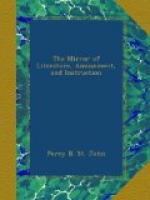Here we cannot trace any co-mixture of science and
scepticism, and in vain shall we look for the spawn
of infidel doctrine. The same excellent feeling
breathes throughout
Salmonia, one of the most
delightful labours of leisure we have ever seen.
Not a few of the most beautiful phenomena of Nature
are here lucidly explained, yet the pages have none
of the varnish of philosophical unbelief or finite
reasoning. “In my opinion,” says one
of the characters in the Dialogue, (to be identified
as the author,) “profound minds are the most
likely to think lightly of the resources of human
reason; and it is the pert superficial thinker who
is generally strongest in every kind of unbelief.
The deep philosopher sees changes of causes and effects,
so wonderfully and strangely linked together, that
he is usually the last person to decide upon the impossibility
of any two series of events being independent of each
other; and in science, so many natural miracles, as
it were, have been brought to light,—such
as the fall of stones from meteors in the atmosphere,
the disarming a thundercloud by a metallic point,
the production of fire from ice by a metal white as
silver, and referring certain laws of motions of the
sea to the moon,—that the physical inquirer
is seldom disposed to assert, confidently, on any
abstruse subjects belonging to the order of natural
things, and still less so on those relating to the
more mysterious relations of moral events and intellectual
natures."[7]
Many other passages in Salmonia gush forth
with great force and beauty, and sometimes soar into
sublime truths. Thus says the eloquent author:
“A full and clear river is, in my opinion, the
most poetical object in nature. Pliny has, as
well as I recollect, compared a river to human life.
I have never read the passage in his works, but I have
been a hundred times struck with the analogy, particularly
amidst mountain scenery. The river, small and
clear in its origin, gushes forth from rocks, falls
into deep glens, and wantons and meanders through
a wild and picturesque country, nourishing only the
uncultivated tree or flower by its dew or spray.
In this, its state of infancy and youth, it may be
compared to the human mind in which fancy and strength
of imagination are predominant—it is more
beautiful than useful. When the different rills
or torrents join, and descend into the plain, it becomes
slow and stately in its motions; it is applied to
move machinery, to irrigate meadows, and to bear upon
its bosom the stately barge;—in this mature
state, it is deep, strong, and useful. As it
flows on towards the sea, it loses its force and its
motion, and at last, as it were, becomes lost and mingled
with the mighty abyss of waters.”




